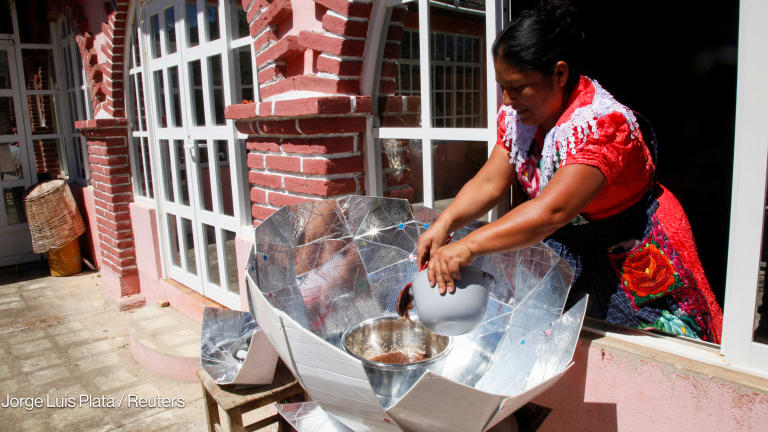
LONDON — The global development conference season is upon us. The past month alone has seen the World Health Assembly in Geneva, the Global Entrepreneurship Summit in The Hague, the Istanbul Development Dialogues in Turkey, Women Deliver in Vancouver, the EAT Forum in Stockholm, and now the European Development Days in Brussels — to name just a few.
While the proliferation of development conferences has enhanced dialogue across the sector, it also comes with a significant carbon footprint, with thousands of people flying in to be under the same roof. The conferences named here range between 1,000 and 6,000 delegates in size.
“There really isn’t anything that an individual can do to cause climate breakdown more quickly than getting on a plane and flying somewhere.”
— Peter Kalmus, climate scientist, UCLADevex contacted conference organizers to ask about their carbon footprint. Two did not reply. Three said they didn’t know.
Only this week’s EDD, organized by the European Commission, offered its numbers. It said last year’s event emitted close to 7,000 metric tons of CO2. That’s the equivalent to the greenhouse gasses emitted by putting about 1,500 extra cars on the road for a year, according to the Environmental Protection Agency’s carbon calculator. EDD is a mid-sized event of around 2,000 delegates in a crowded calendar that includes much larger conferences.
With the development community working hard to protect against and respond to the problems caused by climate change, many say it’s an issue organizations need to think harder about.
“We need to think a lot more about these events in terms of time, environment [and] money,” said Susannah Hares, a senior fellow at the Center for Global Development who has previously described the number of conferences in the international development sector as “overwhelming."
A carbon footprint is defined as the amount of carbon dioxide released into the atmosphere by a person, activity or event. For a conference, the calculation would take into account how many people are attending, how they are travelling there, the energy used to power the venue, where food has been sourced from, and so on. But air travel is often the key contributor.
When the University of California, Santa Barbara calculated the carbon footprint for all its campuses and activities in 2016, it found that “roughly one third of UCSB’s carbon footprint comes from faculty and staff flying to conferences, talks, and meetings.”
Peter Kalmus is a climate scientist at the University of California, Los Angeles’ Joint Institute for Regional Earth System Science & Engineering who has written about the problem of the international conference culture in academia.
“There really isn’t anything that an individual can do to cause climate breakdown more quickly than getting on a plane and flying somewhere,” he told Devex. “Those of us who are frequent flyers, flying to lots of conferences, that’s certainly dominating our carbon footprints.”
Most of the conference organizers Devex spoke to said they had taken steps to reduce the use of paper and plastic on site but otherwise did not have extensive environmental policies in place. A spokesperson for the United Nations Development Programme, which runs the Istanbul conference, added that they have a team “focused on how to transform our footprint” for future events.
EDD is unusual in having a carbon offset program. Any organization presenting there is required to contribute to development programs that will reduce emissions elsewhere. Recommended projects this year include an effort to reduce deforestation in Peru, the building of a geothermal power station in Indonesia, and planting trees on degraded land in Kenya.
In this way, EDD says it offset 10,200 tons of CO2 emissions last year — more than the amount it was responsible for releasing. The U.N. flagship annual climate meeting, the Conference of the Parties, also has a carbon offset scheme which makes it carbon neutral.
But for Kalmus, that's not enough. “My view is that's the wrong way to go … At the end of the day, we still have more carbon in the system than we would have,” he said, explaining that the climate emergency means we need to be reducing our emissions, not just neutralizing the impact of them.
He added that “there’s no guarantee that the offsets are actually effective,” and worried that the option to offset can end up muting the sense of urgency for people and organizations to reduce their emissions.
“It’s too urgent at this point to have an excuse,” Kalmus said.
Some organizations are encouraging their employees to travel less, or by other means. In 2009, the World Wildlife Fund U.K. committed to reducing the number of flights its staff take each year by 20%.
And Csaba Mezei, general secretary of CEEweb for Biodiversity, a network of environmental NGOs in Central and Eastern Europe, said that while travel is sometimes necessary to fulfill its mission — for example, to reach policymakers — they avoid it as much as possible, choose low-impact options where it is necessary, and prioritize attending conferences with a strong carbon reduction plan.
Some individuals are making the same decision and looking to digital technologies to reduce the need to attend conferences in person.
“I find you can save money, time, and cut your environmental footprint by following conferences on Twitter,” David McNair, executive director at the ONE Campaign, told Devex. “You get the main points, can read the reports that are launched, and can share ideas too. Of course, you miss the random connections made at coffee breaks and the depth of roundtable discussions, but the time you get back is well worth it.”
Although more and more people are using the internet to tune into in-person conferences remotely — via social media or livestreaming — UCSB went one step further following its carbon footprint analysis.
It developed a “nearly carbon-neutral” model for conferences that take place entirely online. Talks and panel sessions are recorded in advance in a way that can incorporate multimedia content and slideshows. Viewers can participate in online forums and debates. UCSB estimates that the “NCN” conferences it has run so far emitted about 1% of the greenhouse gases created by traditional events.
Several people pointed to other benefits of a digital approach to collaboration — making conferences more accessible to participants from the global south, with less overhead in terms of financial costs and travel time, and more permanency as conversations are recorded for the future.
For Kalmus — who is also the founder of NoFlyClimateSci, a forum where people and organizations can share experiences and resources around cutting down on flights — there are ways to make in-person conferences more environmentally sound. But the global community really needs to be thinking beyond that, making use of remote and virtual technologies in ways which “we’ve barely begun to imagine.”
“We probably shouldn’t try to replicate what we’re doing now but with flying less,” he said.
“Instead, I think we should move forward into the future and think about other ways to collaborate that don’t involve … using fossil fuel to move our bodies through space at great expense to the climate for future generations.”








